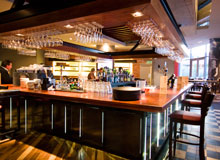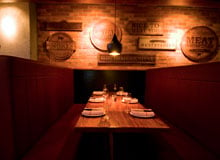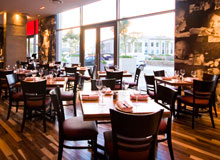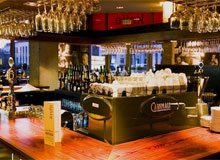
Top stories

Energy & Mining#MiningIndaba: Untapped mineral potential shows South African mining is a sunrise industry
14 hours





More news













Construction & Engineering
Egypt plans $1bn Red Sea marina, hotel development













South Africans all love good food. We justify ordering haute cuisine because: one) it is expensive; two) we can't pronounce it; three) it will impress our date. Applying these steps anywhere else wouldn't be wise. Thus, it is imperative that restaurants use familiar words like fillet, braised, flamed-grilled and chocolate with unfamiliar jargon attached, but even with these key words, often (those who are brave enough!) will venture to ask what this expensive, unpronounceable dish is:
"What is tjus? Or is it juice?"
"No sir, jus, is pronounced 'joo'."
At the same time the patron has an image of said waiter going up to the chef: "Hey, you'll never guess what the guy on table 34 said!"
Certain restaurants have completely missed the plot (I'm not saying which, chefs are a sensitive breed) and can only serve French-speaking clientele or those educated in gourmet food.
Countless restaurants serve affordable, decent, pronounceable food, but usually we feel cheated ideologically and culturally. Especially when it comes to our personal favourite: meat. The question I'm trying to ask is: Can we still have cheap and cheerful restaurants without suffering from crippling social damage?

Jonathan Japha, executive chef of Knife, a new restaurant specialising in meat, had invited me to lunch. Located on the outskirts of Century City, inside the palatial modernistic Crystal Towers, it's an unlikely setting for a steakhouse. Knife is of the American Deep South school of thought. The methods involved in cooking are similar to other steakhouses, but with a Creole twist. Ribs, for example, are still flame grilled and basted, but are smoked with wood chips taken from wine casks instead of being poached. The leather chairs and booths are maroon (tying in with Fork, its sister restaurant's decor). The floors are made from hardwood and the tables are set up with large steak knives nestled on pin-stripe napkins and side plates. It's all very salt-of-the-earth, vintage Americana with a touch of class. What is unique is the bar; located in the middle of the restaurant, it functions as a social central point, and sticking with the theme, there are more than a handful of good American bourbons and a fair share of cocktails to indulge in while missing the afternoon traffic after a long day at the office.
I was sitting in one of the many booths. Jonathan had just got up and was placing an order with the waitress, keeping it a surprise. The concept of Knife and Fork, a tapas restaurant, is apparently part of a bigger idea. According to Jonathan, he's working his way through the cutlery set. Spoon, I imagine, will be a cafe serving tea and cakes.
The first dish arrived and, surprisingly, it was a salad. I was kindly asked by Jonathan to stop taking down notes and enjoy. While I did, he took me through the ingredients: beetroot, smoked goat's cheese served with toasted croutons, baby greens and tomatoes.
"I am not trying to reinvent the wheel," Jonathan stated. "I just keep doing basic things really well and nothing goes wrong." And it works.
I asked him about his take on restaurants and food culture in general.
"What is the function of going to a restaurant? There are times when you go out for an artist's experience and it's great. When a Jackson Pollock painting sells for a million rand for what is, essentially, a few splatters of paint, one has to ask a few questions. I don't mind, Pollock is a lot more famous than I am; maybe there is some inner meaning, but I try and make sure that I don't get carried away with the celebrity value of this profession. What I do is make nice food so that people can carry on with their life.

"Food shouldn't lose the plot. I love burgers. I think they're really cool. I enjoy them all the time from all over. The actual concept of the hamburger is simple; it's great and really undemanding, and that's what we are doing here. You can come here and order a burger and enjoy it and it's made well and you can get it for 50 bucks not 120, otherwise what's the point?"
The main course arrived: ribs marinated with a special basting with an orange zest accompanied with token chips and corn on the cob. And Creole fish cake, not crumbed, made with Norwegian salmon and hake on smoked tomato relish, wilted spinach and courgettes. The waiter put a plastic bib around my neck. Jonathan laughed: "It's the rib vibes. This is America."
Both dishes were presented with effortless sophistication. The ribs were extremely tender, somewhere between a sirloin and a lamb shank; tasty and a messy delight. The way Jonathan goes about getting this right, is marinating them, then smoking them, afterwards he flame grills and bastes them again. Smoking meat is very archaic; it's a method that was used before the fridge was invented, in an effort to preserve meat. The taste was a bonus. He points to "The Beast" in the kitchen: a massive oven that does all the smoking. It takes up a quarter of the kitchen. The wood he uses differs for fish and meat. The wood tray is kept inside in a separate compartment and the rest of "The Beast" acts as an oven, sealing the flavours in the meat. The preferred method, of poaching ribs, usually removes a lot of the flavour.
Even though the ribs are delicious, the fish is the star-spangled banner. Tomato and fish seems like an unlikely paring, but the smoking combines the two. The marriage of the salty fish and the sweetness of tomato combined with the texture of spinach is excellent and a success.
Time for dessert: key lime pie, a lime-curd pie served with berry coulis. The soft texture is creamy and your mother would want to know the recipe. Sadly, the crust is a bit hard, but, as usual, all the portions are more than elegantly sufficient, making up for it. It's good, but Jonathan's the first to point out that "it's nothing revolutionary".
He continued: "It's simple and it's something that people understand. I've worked in very fancy and sophisticated restaurants in my life. It was a lot of stress, anguish, crying and potential divorce threats from my wife. I am not convinced that's the answer for food. I think it's very elitist and you can easily get lost. I realise that there must be some technical merit being able to make something like crab foam. But why would you want to? Crab foam; is that what the pinnacle of what our society has come to? I would rather make something that's been made for the last 200 years, because it's brilliant."

You might dislike Jonathan Japha and Ed Saunders (the owner) for using America as inspiration for making a restaurant, but it's got South African-quality food and the South African in mind, and enough flair for the fashion conscious restaurant diner. I can go into more detail about every aspect of Knife. I can tell you that they use Chalmer beef and the time they take for maturing. Which is all very impressive, but it's nothing your palate and eye needs to understand to enjoy the meals. It comes at a very attractive price in a very professional and still oh-so upmarket setting, allowing you to don your trendiest frocks, heels and suits, and still be able point at the menu and mutter, "I want that one".
Contact details
Crystal Towers, corner Century Boulevard and Rialto Road, Century City
Tel: 021 551 5000
Open from: 11 to 11
Smoking: No
Corkage: 25 rand for wine, 50 rand for sparkling wine.
Child friendly: Yes
Wheel chair access: yes
